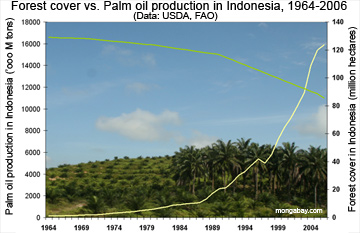Biodiesel demand could destroy world’s forests
Biodiesel demand could destroy world’s forests
Rhett A. Butler, mongabay.com
October 4, 2007
Growing demand for biodiesel could drive large-scale forest conversion for energy crops, warns a study published in Conservation Biology.
With petroleum supplies expected to peak in the next 5-30 years and growing concern over climate change, biodiesel production may expand by 100-fold by 2050, estimates Lian Pin Koh, a researcher from Princeton University. Koh says that much of this expansion could come at the expense of forests, but the degree of which depends on the feedstocks used. Energy crops like palm oil are significantly more productive than more widely used rapeseed — which currently accounts for 84 percent of biodiesel production — but are more likely to be established in carbon-rich and biodiverse ecosystems like the tropical forests of southeast Asia. As such, the environmental trade-off between feedstocks is complex.
Analyzing yields and planting trends for four major biodiesel feedstocks — rapeseed, sunflower seed, oil palm and soybean — and projecting future demand for biodiesel, Koh calculates land requirements for various crops to meet projected demand for biofuels.

Forest cover versus palm oil production in Indonesia. |
“My calculations showed that the scenario of soybean-based biodiesel production to meet future global biodiesel demand would likely result in the highest amount of habitat loss (76.4—114.2 million ha) compared with alternative scenarios of sunflower seed- (56.0—61.1 million ha), rapeseed- (25.9—34.9 million ha), and oil palm-based (0.4-5.4 million ha) biodiesel production,” wrote Koh. “Fulfilling this requirement would entail a substantial worldwide expansion of feedstock cultivation. This could lead to potential land-use conflicts, in particular with the need to preserve the world’s remaining natural habitats.”
To reduce the impact of forecast biodiesel expansion, Koh recommends increasing the area of natural forest under protection, improving oil-yield efficiency of major biodiesel feedstocks, and looking for alternative energy sources beyond biodiesel.
“Future intensification of biodiesel feedstock production in [the tropics], without proper mitigation guidelines, will likely further threaten the high concentrations of globally endemic species in these biodiversity hotspots,” Koh continued. “Given the need to reduce our dependence on fossil fuels and the economic inertia for agricultural expansion in
the tropics, there will be no easy solution to the problems caused by intensification of biodiesel feedstock production. There are, however, several key mitigation practices that could help.
Related
Environmentalists and palm oil producers should work together
Environmentalists and palm-oil producers are increasingly at odds. Greens groups say palm oil is driving the conversion of tens of thousands of hectares of peatlands and lowland forest in Indonesia, putting wildlife at risk, increasing the vulnerability of forests to fires, and triggering large emissions of greenhouse gases.
Palm oil doesn’t have to be bad for the environment
As traditionally practiced in southeast Asia, oil palm cultivation is responsible for widespread deforestation that reduces biodiversity, degrades important ecological services, worsens climate change, and traps workers in inequitable conditions sometimes analogous to slavery. This doesn’t have to be the case. Following examples set forth by the Roundtable on Sustainable Palm Oil and firms like Golden Hope Plantations Berhad, a Malaysian palm oil producer, oil palm can be cultivated in a manner that helps mitigate climate change, preserves biodiversity, and brings economic opportunities to desperately poor rural populations.
Eco-friendly palm oil could help alleviate poverty in Indonesia
The Associated Press (AP) recently quoted Marcel Silvius, a climate expert at Wetlands International in the Netherlands, as saying palm oil is a failure as a biofuel. This would be a misleading statement and one that doesn’t help efforts to devise a workable solution to the multiplicity of issues surrounding the use of palm oil.














